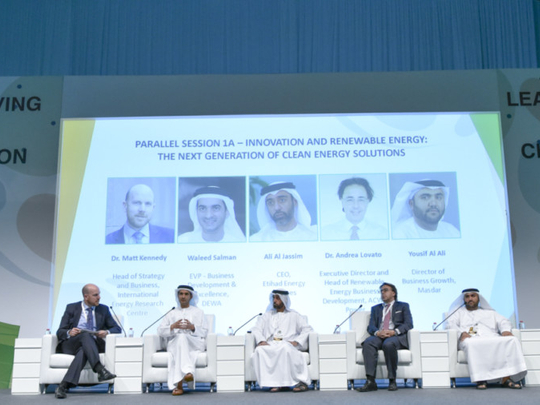
DUBAI
Improved energy storage and increasing efficiency of photovoltaic (PV) solar power will be the primary technological innovations for the region’s energy sector over the next two or three years, experts said.
A panel of experts examining energy innovation at the World Green Economy Summit at Dubai World Trade Centre on Tuesday said storage was the single biggest factor in the adoption of renewable energy, particularly solar energy that is favoured in the Middle East.
They expected battery storage to become cheaper and capable of storing solar energy for longer, up to six or seven hours, though heating salts through concentrated solar power (CSP) would continue to be the chosen method of storing energy overnight.
But still, technology moves fast, said Ali Al Jassim, CEO of Etihad Energy Services, citing several changes that could make an impact on energy usage. “The trend is towards having solar in almost every item we use, towards solar in our daily lives. I’ve seen products and articles with solar — companies bringing sunlight to the parking of a high-rise building. I’ve heard people talk about reducing cooling [costs] by cooling the floor rather than cooling the air, and people using air filters to distribute the cold environment rather than consuming energy by using their air conditioning.”
Dr Andrea Lovato, Executive Director and head of renewable energy business development at ACWA Power, said innovation in energy storage was only one factor which would lead to greater adoption of renewable energy.
“The other is efficiency — increasing the efficiency of the existing technologies, PV, CSP, combined cycles for example. And [improving] how this is done, for example with smart grids and how we distribute the power.”
Increased digitalisation was also an important part of improving efficiency in fossil fuel plants, he added.
The UAE had advantages in abundant sunlight, a solid regulatory framework and good financing, said Yousuf Al Ali, Director of Business Growth at Masdar. “This gives you fundamentals to allow your to be very aggressive and reach very competitive pricing,” he said.
Waleed Salman, Executive Vice-President of Business Development and Excellence at Dewa, said the important thing as renewables become more common was to ensure all stakeholders were engaged in the process. “If you try to do it alone, you will not be successful,” he said. “Today, we are talking about government, private sector, customers, who are now a key factor in the success of any project ... We don’t leave anybody behind.”












